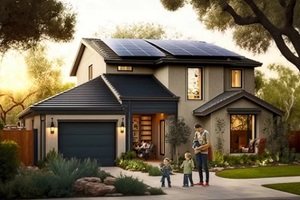
Basic homeowners insurance coverage may not extend to additional structures, such as fences, garages, and sheds. Comprehensive homeowners insurance for Illinois property owners is the best safeguard against unexpected damage to these structures, which may require additional policy protection and riders to cover all contingencies.
Continue reading to learn about the role of other structures’ coverage in protecting homeowners from unexpected damages and liabilities, including how to plan to make sure your entire property retains adequate coverage even when your situation changes.
Understanding Homeowners Insurance in Illinois
Basic homeowners insurance in Illinois includes coverage for certain personal belongings and protection against fire, theft, lightning damage, vehicle damage, and vandalism. In most cases, basic dwelling protection requires additional riders for water and flood damage, certain types of weather damage, protection for valuable belongings, and coverage for other structures on the property.
Illinois homeowners need to know the types of structures their basic insurance protects before itemizing their plans for the riders that they may need, such as other structures coverage. A good rule of thumb is that if the structure is not connected to the main house, it isn’t covered, though a covered walkway could create a gray area for some policy providers.
Types of Structures Covered
Coverage for other structures can protect any structure outside of the main residence. Examples of these structures include:
- Garages
- Sheds
- Workshops
- Gazebos
- Guesthouses
- Docks
- Driveways
- Fences
- Swimming pools
- Walkways
Illinois homeowners should check with their insurance providers to learn how their policies itemize these various features. For example, in-ground and above-ground pools are usually covered differently. In-ground pools may even fall under your basic dwelling coverage. Always check with your provider to learn what your policy covers before looking into additional riders for other structures on your property.
Assessing Your Property’s Needs

The best home insurance companies in Illinois understand that homeowners can have many structures on their property. Their job is to restrict your coverage to the central dwelling while offering riders and exemptions for these other structures. As the homeowner, it becomes your job to evaluate the policy’s fine print to learn what additional coverage you need.
For example, while above-ground pools are sometimes covered by dwelling coverage, the policy may require a walkway or covering connecting the pool to the house to include it without requiring additional coverage.
The value and usage of the structure in question also determine your property’s insurance needs since structures used for commercial purposes, such as a workshop, should be valued higher. Homeowners should also consider the value of the materials and construction when assessing what kind of protection they need.
Ready To Receive A Quote Today?
Provide us with your contact information, select the type of insurance product you are interested in receiving a quote for and a brief description of your coverage needs! One of our experienced brokers will respond to your request in a timely manner.
Common Coverage Options
Standard dwelling coverage may cover connected structures, but homeowners will need further coverage for most freestanding structures on the property. Even when buying other structures’ coverage, many insurance providers omit certain types of damage or property usage from their basic coverage offering, requiring additional endorsements to file claims for damages in those situations.
Common exemptions homeowners should watch out for include:
- Earth movement: Insurance providers may use the term “earth movement” to refer to damages that require endorsements not limited to earthquake damage, such as damage from sinkholes, mudslides, and landslides.
- Flooding: While other structures’ coverage often compensates homeowners for rain damage, water or flood damage usually requires a separate endorsement. If you live in an area prone to flooding, you should consider additional coverage for your shed, workshop, garage, or other freestanding structures that are vulnerable to damage.
- Business structures: Many homeowners use various structures as their business, such as a workshop or a storage facility for business assets such as landscaping or manufacturing equipment. Look for business insurance endorsements to cover these structures.
- Infestations: Termites are a common pest in Illinois, particularly eastern subterranean termites, which destroy wood and cause substantial damage. Most insurance policies require extra endorsements to remove infestations and repair damage.
- Wear and tear: Basic coverage provides homeowners with ways to pay for sudden damage, such as from a natural disaster, but it rarely covers regular wear and tear without additional endorsements. Examples include rotten wood, missing shingles, and other routine damage.
Ensuring Adequate Coverage
Illinois homeowners should conduct regular policy reviews to guarantee that their homes and other structures are adequately covered for any eventuality. Many situations can change, including your business model, home renovations, or property value.

Even the weather and landscape around your property can make a difference in assessing its viability for other structures’ coverage. Work with an insurance agent to customize your property’s insurance endorsements for your needs. Regularly review these endorsements with your agent to find coverage gaps or unnecessary premiums.
Get Comprehensive Coverage with Pro Insurance Group
Other structures can be valuable assets to your home or business that, if left uncovered, can leave you liable for unforeseen damages. At Pro Insurance Group, our team leverages years of expertise in Illinois homeowners insurance reviews to customize policies for our clients that cover all eventualities.
Contact us and schedule a consultation to learn how our experts can help you create a policy that meets your needs and regularly review your policy to make sure your most valuable assets stay covered even when your situations change.
